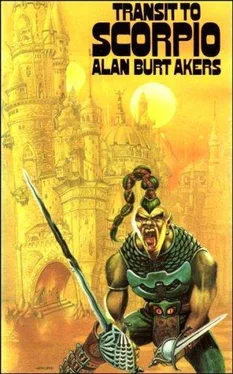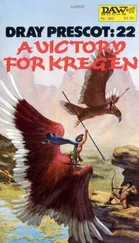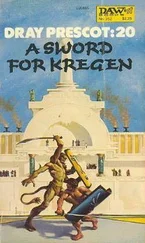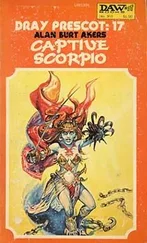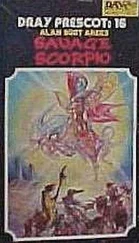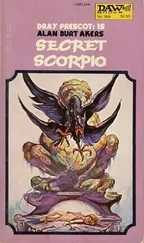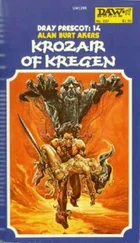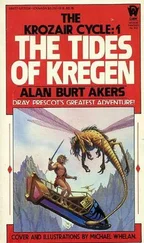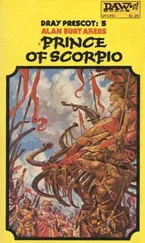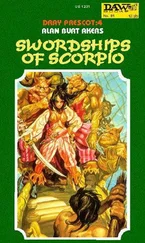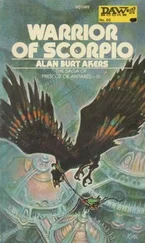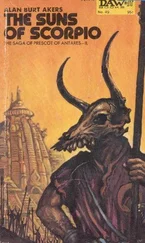Alan Akers - Transit to Scorpio
Здесь есть возможность читать онлайн «Alan Akers - Transit to Scorpio» весь текст электронной книги совершенно бесплатно (целиком полную версию без сокращений). В некоторых случаях можно слушать аудио, скачать через торрент в формате fb2 и присутствует краткое содержание. Жанр: Героическая фантастика, на английском языке. Описание произведения, (предисловие) а так же отзывы посетителей доступны на портале библиотеки ЛибКат.
- Название:Transit to Scorpio
- Автор:
- Жанр:
- Год:неизвестен
- ISBN:нет данных
- Рейтинг книги:3 / 5. Голосов: 1
-
Избранное:Добавить в избранное
- Отзывы:
-
Ваша оценка:
- 60
- 1
- 2
- 3
- 4
- 5
Transit to Scorpio: краткое содержание, описание и аннотация
Предлагаем к чтению аннотацию, описание, краткое содержание или предисловие (зависит от того, что написал сам автор книги «Transit to Scorpio»). Если вы не нашли необходимую информацию о книге — напишите в комментариях, мы постараемся отыскать её.
Transit to Scorpio — читать онлайн бесплатно полную книгу (весь текст) целиком
Ниже представлен текст книги, разбитый по страницам. Система сохранения места последней прочитанной страницы, позволяет с удобством читать онлайн бесплатно книгу «Transit to Scorpio», без необходимости каждый раз заново искать на чём Вы остановились. Поставьте закладку, и сможете в любой момент перейти на страницу, на которой закончили чтение.
Интервал:
Закладка:
“Strombor!” she said. She spoke the name proudly. “I have made up my mind.” She motioned and a slave girl brought forward two sets of scarlet gear for Gloag and myself. “Varden will have need of your strength, Dray Prescot. Will you wear the Strombor scarlet for me, and aid him?”
“I will, Great-Aunt Shusha,” I said.
She picked me up sharply. “I am not your great-aunt, Dray Prescot. Never think it.”
The affection I believed existed between us made me smother by surprise, for, of course, she was right. I was simply a wandering warrior, a clansman, with no claims to relationship with a great noble of the House of Eward or of Strombor. I took the scarlet gear and nodded.
“I will remember, my Lady.”
“Now,” she said, her bird-like eyes bright on me. “Go, Dray Prescot. Jikai!”
That evening as the storm clouds roiled and burst above the city the final plans were made. Clad in the gray slave breechclouts and carrying our magnificent scarlet gear and our weapons rolled in bundles, Gloag and I and the men we had chosen, twenty of us, swam the canal toward the island of Esztercari that had once been the island of Strombor. We entered through that low conduit from which Gloag, Delia and I had escaped-it seemed so long ago-and secreted ourselves.
The messenger from Hap Loder had arrived; in the dawn light the clansmen would reach us. Nath would see to that.
We waited, Gloag and my men and I, in the pouring rain, waiting for the first sign of the lumbering wherries easing through the canal water, dimpled with raindrops, from the marble quarries. The waiting was fretting.
So far I have deliberately made no mention of the Kregan system of time-keeping. But that wait was kept in counting the slow passage of the leaden-footed burs. A bur is forty Earth minutes long, and there are forty-eight of them in a Kregan day and night cycle. The discrepancies in the year caused by Kregen’s orbit of a binary were smoothed out by the addition or subtraction of burs during the festive seasons, and a similar calculation with regard to days at those times. Each bur contains fifty murs, or minutes. Seconds, although known and used by astronomers and mathematicians, are generally unnecessary in the daily commerce of Kregen. The position of the two suns by day, or any of the seven moons by night, can tell a Kregan the time instantly. An uproar broke out far above our heads. It was clearly extraordinarily loud for us to hear it, with the rain splashing down into the canal by our ears. I knew what it was. Up there on the bewildering profusion of roofs the powder blue of the Ewards would be spiraling down in their fliers, the men would be leaping out with rapiers aflame. They had not waited! They had gone into the attack early-and I could half-guess that the pride of the Eward House could not stomach waiting for my tough clansmen to strike the first blow. The fliers would be swirling away to bring more fighting men. The emerald green would be surging back, now. There would be death, violent, ugly death, sprawling all over the rooftops and down the stairways of the Esztercari enclave. And I was waiting here, helpless, in the rain.
By the nearness or the distance of the noise of combat we could tell how went the fray. And soon it was clear the Esztercaris were smashing back the men of Eward. Our allies in the Houses aligned with us and contracted to keep in play the Ponthieu and the others of their enemies. It was between Esztercari and Eward. The Houses varied in numbers of population and a Great House, whether Noble or Lay, might contain as many as forty thousand persons. Because of the practice of hiring guards, mercenaries, either men or half-men or half-beasts the actual numbers of fighting men available to a House was more than a normal breakdown of population would yield. We had estimated there would be about twenty thousand fighting men against whom we must strike in the Esztercari House. I had told Hap Loder he must leave ten thousand of our clansmen with the tents and wagons and chunkrah. If we failed and disaster overtook us, the clans must have a cadre on which to build afresh. Hap was bringing about ten thousand warriors.
“They have struck too soon,” Gloag was saying from where he lay at my side in the rain. “Where are the clansmen?”
Through the veils of rain we stared down the canal until our eyes stung.
Was that a wherry? Shadows moved through the rain as it hissed into the water. Gray shapes, moving vaguely, like pack mastodons, through the mist-veils? The suns were up now and trying to strike through the sodden cloud masses. Was that a harder shape, a long broad shape in the water, with the figures of men like ants poling it along? I stared-and-
“Time!” I said, and stood up and took my sword.
Without a second glance for the first wherry, which now showed its blunt snout over the rippled water, I led my men through the postern to the conduit and, clad in our slave gray, we hurried up the winding stair. The Chulik guards had split, half remained at their posts, the other half had gone to repel the rooftop attack. We cut them down instantly.
Then we flung our shoulders to the windlass and gradually the deadweight of the portcullis over the entrance canal lifted. We strained and struggled and puffed. Through an arrow slit I could look down from the masonry onto the mouth of the canal. The portcullis rose, dripping. And the snout of the wherry ghosted under it, heading into the Esztercari fortress, and in the bows, standing with bow in hand, was Hap Loder. Cheekily, he looked up, and waved.
We left the windlass dogged so that all the remaining wherries Nath had arranged to steal from the marble quarries and which had been packed overnight with clansmen could pass. Then we hurried through ways known to Gloag, down dim corridors and flang-infested crannies, until we reached the slaves’ cess-pit door. We flung it open, cutting down the Och guards, let in Hap and my men. Other clansmen led by Rov Kovno branched away at once. Loku would be bringing his men in through the postern conduit opening we had used. Now my clansmen were loose within the fortress of the Esztercari!
Once my men had solid roofs above their heads they dried their hands and then brought out the carefully coiled bowstrings from their waterproof pouches, strung their bows with quick practiced jerks. Their plains-capes were thrown off with the rain slick and shining upon them. The feathers of their arrows bristled from the quivers over their right shoulders, dry and perfect. We went hunting emerald green.
I believe I do not want, at this time, to dwell on the taking of the Esztercari enclave. We killed the enemy, of course; we drove them in a wave of shafts and steel from wall to wall and corner to corner; we linked hands with the exultant ranks of men in powder blue; but we sought to win the victory and not just simply to kill. Where that was necessary we did so, for that is the nature of warfare. But hundreds of emerald green sets of clothing floated in the canals as the mercenaries fled, and gray tunics with the green bands, and we did not pursue. We did not set flame anywhere, for I had told my men that this great House was the home of a noble lady, Shusha of Strombor.
I wore my old scarlet breechclout; and over it the brave scarlet gear of Strombor, as I had promised Shusha. Like my clansmen I did not disdain the wearing of armor, and had strapped on a breast and back, a pauldron over my left shoulder, and arm and wrist bands on my left arm. But my right arm and shoulder were naked, as they had been when I hunted in my Savanti leathers. In the press the blow that kills comes so often unseen, from the blind side, from the back. Armor can save a man’s life then. It saved mine.
The final stand was made around the noble quarters in the opal palace.
Читать дальшеИнтервал:
Закладка:
Похожие книги на «Transit to Scorpio»
Представляем Вашему вниманию похожие книги на «Transit to Scorpio» списком для выбора. Мы отобрали схожую по названию и смыслу литературу в надежде предоставить читателям больше вариантов отыскать новые, интересные, ещё непрочитанные произведения.
Обсуждение, отзывы о книге «Transit to Scorpio» и просто собственные мнения читателей. Оставьте ваши комментарии, напишите, что Вы думаете о произведении, его смысле или главных героях. Укажите что конкретно понравилось, а что нет, и почему Вы так считаете.
